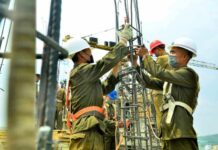
Daily NK recently obtained the version of North Korea’s emergency quarantine law that was amended in May 2022. Although it is not the latest version of the law, the acquisition is nonetheless significant as it provides insight into what the government focused on after officially acknowledging an outbreak of COVID-19 in May of last year.
FOURTEEN MEASURES ADDED TO AMENDED LAW
Through an analysis of the document, Daily NK confirmed that last May’s amendment changed 18 articles from the immediately preceding version of the law.
The article that stands out the most is Article 61, which changed the name of the “maximum emergency system” to the “maximum emergency epidemic prevention system,” as well as spelling out what exactly the change entailed. North Korea transitioned to the maximum emergency epidemic prevention system after it disclosed its first COVID-19 outbreak on May 12 of last year. The amendment of the law appears to have been focused on giving shape to legal measures to support the transition.
First, North Korea deleted most of the content in the original article and added a total of 14 measures related to the maximum emergency epidemic prevention system.
Major measures included in the law are as follows: regional lockdowns; isolating fever patients and other individuals with suspicious symptoms; establishing measures to stabilize people’s livelihoods; bolstering lockdown duties of the General Staff Department of the Korean People’s Army, state security agencies and social security agencies; criminal punishments for people who sow chaos by spreading rumors and engaging in other socially harmful behavior; acquiring emergency supplies; the 24-operation of drug stores and drug stands; sanitizing and testing of wastewater and waste materials; and treating lax execution or mistaken execution of commands and orders as high treason.
The law more clearly specified the duties and roles of agencies related to emergency quarantine efforts, while at the same time codified measures to prevent social chaos from lockdowns and other policies.
Articles of the law that pertained to the production, supply and management of medical supplies were also amended, as were articles regarding criminal punishments.
In Article 64, Clause 5, the wording changed from “rashly raising the price of a product or waiting for the price of a product to increase” to “rashly raising the price of a product or medicine or waiting for the price of a product or medicine to increase.”
To Article 65, the authorities added the line, “People who sold unlicensed homemade drugs, or sold fake drugs, defective drugs, or drugs that fail to adhere to sanitation or safety standards.” The article also was amended to state that money and medical supplies could be confiscated for violations of the law.

New language was added to Article 67, which deals with the punishment of officials who violate the emergency quarantine order, including: “allowing unlicensed people to sell drugs, or failing to ensure the sanitation and safety of medicine” and “rashly issuing prescriptions.”
The language appears to have been added to the law as part of efforts to eradicate the misuse of medicine, a situation that grew even worse during the COVID-19 pandemic.
In fact, according to an analysis on causes of death released by the State Emergency Anti-epidemic Command via Korea Central TV last May, 32 of 68 deaths — or 47.1% — were caused by the side effects of drugs, the largest share of deaths as reported by the government.
ENCOURAGING USE OF “NON-CONTACT PAYMENTS”
While amending the emergency quarantine law last May, North Korea also added language that encouraged the use of “non-contact payments.”
Article 26, Clause 14 was changed to, “All service units that take cash should adopt several electronic payment systems through mobile phones, oversee that they are working normally and take relevant measures.”
Article 64 includes an explicit call for fines “when payments via electronic payment systems are refused without a justified reason.”
This language was likely aimed at preventing the spread of communicable diseases through cash-based transactions. The law also encouraged the sterilization of cash.
Daily NK reported in February that North Korean authorities mandated that shops install high-priced cash sterilizers, leading to complaints from shop staff.
North Korea amended its emergency quarantine law once again last November after it declared “victory” in its war against COVID-19. State-run media reported that on Nov. 15, a Permanent Commission Session of the Standing Committee of the Supreme People’s Assembly adopted the amended quarantine law. The report explained that the revision “supplemented major issues that arose in strengthening the material and technical base in the quarantine and healthcare sectors with a view to quickly and actively responding to the infectious disease crisis.”
Translated by David Black. Edited by Robert Lauler.
Daily NK works with a network of reporting partners who live inside North Korea and China. Their identities remain anonymous due to security concerns. More information about Daily NK’s reporting partner network and information gathering activities can be found on our FAQ page here.
Please direct any comments or questions about this article to dailynkenglish@uni-media.net.

















